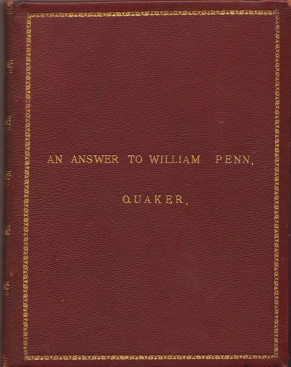 |
||
| Title | An Answer to William Penn, Quaker, | |
| Author | Lodowick Muggleton | |
| Year of Publication |
1673, 1753? and 1835 |
|
| Links | This book may be found here | |
This book was published in response to William Penn's work "the New Witnesses proved Old Heretiks" and contains eight distinct sections dealing with the following subjects:
- That God has always had a human form
- That earth and water are eternal
- That the soul of man is generated by man and is inseparable from the body
- That the soul is mortal until the resurrection
- That God transmuted himself into the virgins womb
- In support of predestination
- A reply to the discourse with William Penn
- The armour of god and a rather eccentric discourse on attacks by wild beasts
I do not find this an easy book to read and the theology can be hard to understand. Some of the theology and biblical interpretation is genuinely interesting, although some is based on underlying assumptions and a rather surprising amount of "reason". The defense of predestination is also surprisingly strong given the movements later aversion to the concept. In order to understand this book you have to first read Penn's aforementioned work or its context is lost.
Many of the responses to Penn's arguments are quite impressive and he certainly refutes many of Penn's objections, where Muggleton has problems is unsurprisingly in defending the authenticity of his commission.
In chapter 33 Muggleton accepts Penn's accusation that he had used two unsavory words during their discourse and implicitly accepts that such action was sinful, but he cannot bring himself to apologise for such actions. This attitude reflects a certain refusal to accept his own sinful nature, in chapter 32 he says:
"I turned myself to read in another book that was opened to me, even the book of conscience, and I read in the book of my conscience, that I was not guilty of any actual breach of this law written in my heart, which was some ease to my mind, that if I were to suffer eternal death by this law, yet my torments would be the less, because I had committed no actual sin;"
Even the Muggletonian doctrine of the two seeds accepts the coexistence of both natures in man, it is hard to see how a man can seek forgiveness of his sins if he feels himself to be sinless and I do not understand how the subsistutionary death of Jesus can be seen to ne necessary if one is sinless This position is certainly not orthodox.
The doctrine of the soul's mortality is well set out, although the doctrine is more properly termed as mortality until resurrection to eternal life. There is a certain attraction in such a doctrine when the more orthodox position has resulted in a certain cavalier attitude to the death of the body, as Muggleton states in chapter 25:
"What harm then did did those murderers do to those men that sent their souls to God to worship him, and their bodies to the grave, where they were quiet and still, so that neither bodies nor souls were not slain , nor suffered no harm?"
While the syntax is a bit labored, not to mention a quite exquisite use of double negatives, the thrust is that if the souls is immortal under the orthodox system anyone killing a Christian is in fact carrying out an act of kindness. They should not be judged for such an act if the soul is immortal, however the law, scripture and reason count the act as a great wrong. As Muggleton explains:
"If the soul slips out of the body of man, when man's blood is shed, and his soul receives no harm: why then doth judges put men to death that did shed the other man's blood? if he did but separate his soul from his body " .